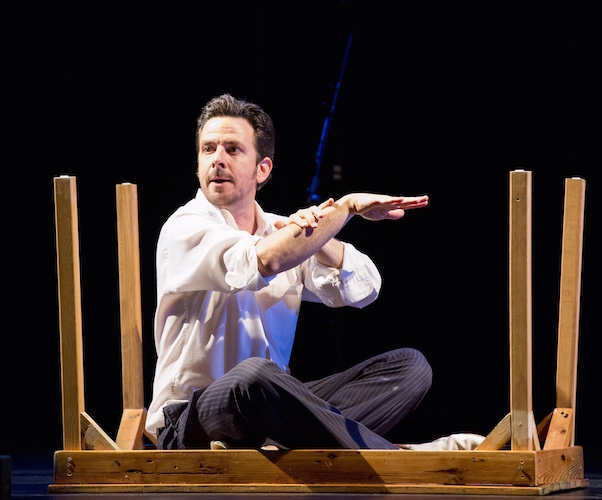Theater Review: “17 Border Crossings” — Journeys to Nowhere
Was this trip really necessary?
17 Border Crossings by Thaddeus Phillips. Directed by Tatiana Mallarino. Presented by Arts Emerson at the Emerson/Paramount Center’s Jackie Liebergott Black Box Theatre, Boston, MA through April 29.

Thaddeus Phillips in “17 Border Crossings.” Photo: Marc Simpson
By Helen Epstein
The set of 17 Border Crossings, Thaddeus Phillips’ one-man show, promises an intriguing theatrical journey with a minimum of props: a 15 foot horizontal light beam; a plain wooden table and chair; a Tensor desk lamp; a radio; and a microphone. These will be utilized in the service of what Phillips has called ”liquid theater.”
His performance begins with Shakespeare’s beautiful and allusive St. Crispin’s Day speech from Henry V:
No, faith, my coz, wish not a man from England
God’s peace! I would not lose so great an honour
As one man more methinks would share from me
For the best hope I have. O, do not wish one more!
Rather proclaim it, Westmorland, through my host,
That he which hath no stomach to this fight,
Let him depart; his passport shall be made,
And crowns for convoy put into his purse;
We would not die in that man’s company
That fears his fellowship to die with us.
This day is call’d the feast of Crispian —
“I love that speech,” Phillips, the American traveler, declares in the amiable, somewhat naïve tone that characterizes his narrative. He goes on to point out that it was Henry V who is generally credited with inventing the passport.
The mini-tutorial on passports that follows might have provided a starting point for a more self-aware production, one that considers the necessity (and preciousness) of a passport in 2017. Instead, it kicks off the monologue of an amiable but bumbling American re-enacting his travels, and stories he’s heard about other travelers, over the last 30 years. These episodes involve crossing borders by train from the Czech Republic through Hungary into Serbia; by ferry from Italy to Croatia; by plane from Angola to the UK; by bus from Holland to France; by tunnel from Egypt to Gaza. What the travelers carry should have inspired his curiosity but, perhaps because the material is so old or the narrator so utterly clueless, he doesn’t let us in on his reaction when a smuggler tosses five suitcases out the window of a moving train or a Gazan family orders KFC from Egypt.
17 Border Crossings premiered in April 2011 in Philadelphia and is based on Phillips’s travels between 1989 and then. Athough it has been developed since the events of 9/11, and segments added, the narrative does not reflect the major world events that have shaped travel (and crossing borders) over the past decade. Consequently, the script has been rendered all but irrelevant. Theatergoers who travel abroad in 2017 will be struck by the quaint obsolescence of some of these border episodes, and wonder about the absence of refugee camps, barbed wire, and generations of boat people.
In light of so much immigrant trauma, Phillips’ anecdotes come off as frivolous, simplistic, provincial, and tone-deaf. Since the playwright began by quoting Shakespeare, I found myself thinking: “much ado about nothing.”
The first set of border crossings allow the actor to display his command of gesture and accents, switching between the roles of American train passenger to Czech, then Hungarian, then Serbian ticket-taker. Not much to ponder in this segment, but we get to see the long LED light bar made use of.
That bar serves to indicate a jet on an Angolan airfield in the next episode. It then serves as part of the décor of border crossings in Israel and Jordan; Syria and Greece; the Red Light district of Amsterdam. The wooden customs desk evokes a chairlift between the Austrian and German Alps and, then, part of the Gaza tunnel. The lamp and microphone are also put to use.
The script is so lacking in interest that the viewer is led to focus on the lighting and sound design. Culture-appropriate music emanates from the small radio onstage. Muezzin calls and church bells evoke East and West Mostar, Bosnia; compelling soundtracks suggest Cuba, Bali, Colombia, and Brazil. The culminating lighting extravaganza occurs at the border between Juarez, Mexico and El Paso, Texas.
Phillips is an intriguing actor to watch and director Tatiana Mallarino is inventive, but the pair are not nearly compelling enough to generate drama out of this lackluster script. Why did Phillips chose to revive a mildly amusing piece that was inconsequential in 2011 but approaches the offensive in 2017? Was this trip really necessary?
Helen Epstein is the author, co-author, editor or translator of ten books of non-fiction. She e-publishes classics of non-fiction with Patrick Mehr here.
Tagged: 17 Border Crossings, ArtsEmerson, cultural vulture, passport, Tatiana Mallarino, Thaddeus Phillips
